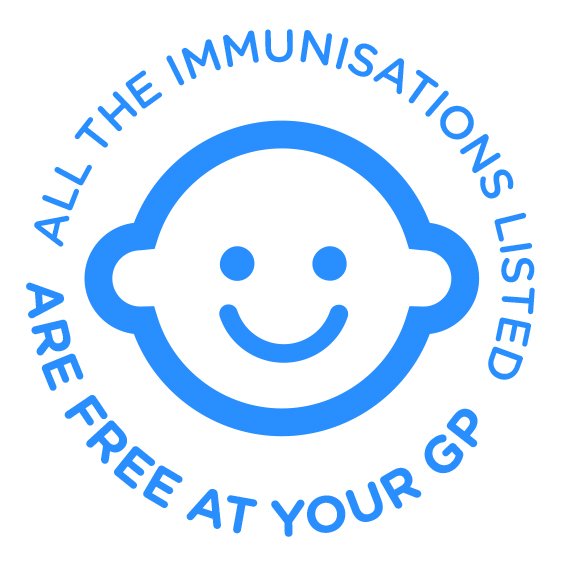This page provides a brief summary of the disease and the vaccine that is available to prevent it. Links to more detailed information are provided at the bottom of the page.
What is Hib (Haemophilus influenzae B) ?
Haemophilus influenzae b (Hib) is a bacterium that can cause serious infection in humans especially in children, It can also cause serious infection in people with a weakened immune system or those who have no spleen or where the spleen is damaged by disease.
How do people get Hib infection?
Haemophilus influenzae b infection is caused by a contagious bacteria. It is spread through the air by coughing and sneezing or even breathing. The bacteria can live in the nose and throat - causing no harm. Sometimes the bacteria can enter the blood stream and spread to the brain or to the bone. This is called invasive Hib infection.
Hib disease is most common in children less than 4 years of age. Babies under one year of age are especially at risk.
What are the symptoms of Hib infection?
Hib can cause serious disease including
- Meningitis (inflammation of the lining around the brain)
- Septicaemia (blood poisoning)
- Epiglottitis (swelling in the throat that causes choking)
- Osteomyelitis (infection of the bone)
Who should get Hib vaccine?
Hib disease can be prevented by vaccination.
All children should get Hib vaccine at 2, 4, 6 and 13 months of age.
The Hib vaccine is given to children as part of the 6 in 1 vaccine at 2, 4 and 6 months of age. The 6 in 1 vaccine protects against Diphtheria, Hepatitis B, Hib, Pertussis (Whooping Cough) Polio and Tetanus.
A Hib booster vaccine is given at 13 months of age. This gives extra protection against Hib infection. This Hib booster vaccine is given as a combined Hib/MenC vaccine.
For children born on or after 1st October 2024 the booster dose of Diphtheria vaccine will be given as a 4th 6in1 vaccine. The MenC vaccine will be given separately.
Back to top
Who should not get Hib vaccine?
There are very few people who should not get Hib vaccine. Your child should not get the vaccine if they have had a severe allergic reaction (anaphylaxis) to a previous dose of the vaccine or any part of the vaccine.
What to expect after Hib vaccine?
After getting the vaccine, your child may have discomfort, redness or swelling around the area where the injection was given. They may be irritable and have a fever.
If this happens you can give them paracetamol. You should also give them plenty to drink. Make sure they are not too warm and that their clothes are not rubbing against the injection area.
Children usually recover from these minor side effects within a day or two
Of the children who are immunised;
- 1 in 5 will have discomfort, redness and swelling where the injection was given
- 1 in 50 will have a fever.
Serious side effects are very rare.
How does Hib vaccine work?
The Hib vaccine contains extracts from the Haemophilus influenzae type b bacteria. The vaccine works by making the body's immune system respond if the vaccinated person comes in contact with Haemophilus influenzae type b bacteria, without causing disease.
How effective is the Hib vaccine?
Between 95% and 100% of children become immune to Haemophilus Influenzae b (Hib) when they have completed the recommended vaccine schedule.
Back to top
Where can I find out more?
All the immunisations listed are free at your GP

This page was updated on 1 October 2024